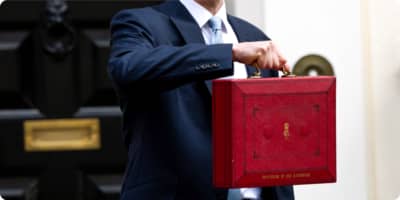With the new financial year approaching, knowing what legislation changes will take effect from April and how to maximize tax deductions to keep your business' taxable profits low is essential.
Filing accurate records is crucial, and having solid systems in place to track your business' income and expenses will make things easier when it comes time to prepare your company's annual accounts and tax returns.
The 2024/25 tax year will see some changes Read on to find out what changes will be coming into effect, and learn more about different small business tax deductions you can use to your advantage in the months ahead. We will cover:
- Corporation tax
- Capital allowances
- Additional tax relief for R&D
- Tax-deductible expenses:
- Business travel
- Staff uniform
- Office and equipment
- Employee costs
- How to claim small business tax deductions
What is the UK corporate tax rate for 2024?
Corporation tax is staying at 19% to 25% for businesses with profits over £250,000 with small profit rate staying the same too. So companies with under £50,000 of profit will continue to pay corporation tax at 19%.
Businesses with profits between £50,000 to £250,000 can claim Marginal Relief on the main corporation tax rate (25%). You can calculate how much Marginal Relief your company is entitled to through HMRC.
Note: Profits will be time apportioned for businesses with accounting periods between the tax year.
Capital Allowances offered in 2024
Capital allowances are a type of business tax relief that enable companies to deduct partial/total costs of certain items from profits before paying tax.
● Full expensing (explained below)
● 50% First-Year Allowance (current rate until 31st March 2026)
● Annual Investment Allowance
What is the full expensing deduction?
Full Expensing is a tax deduction relief scheme.
It enable businesses to claim a 100% deduction from profit (before tax) on qualifying new main-rate plant and machinery investments.
- Examples of plant and machinery that qualify include:
- Office equipment (including desks and chairs)
- Machines (including computers, printers, lathes and planers)
- Vehicles (excluding cars, including vans, lorries and tractors)
- Warehouse equipment (including forklift and pallet trucks, shelving and stackers)
- Tools (including ladders and drills)
- Construction equipment (including excavators, compactors and bulldozers)
Additional tax relief for research and development (R&D)
Suppose your business invests in innovating and developing new processes, products or services. In that case, you may benefit from the additional tax relief.
The 2024 Spring Budget announced the following:
- The RDEC tax credit remains at 20% of a company's R&D expenditure, taxed at the Corporation Tax rate (19% to 25%).
- The RDEC benefit varies between 15% and 16.2% depending on your tax position.
- Loss-making SMEs that spend up to 30% of their total expenditure on R&D could receive relief of up to 27%
What are tax-deductible expenses?
Tax deductible expenses are costs businesses can deduct from their gross income before the income becomes subject to tax. These expenses reduce the total amount of corporation tax owed. You can claim specific expenses related to a business's running costs.
Both sole traders and limited companies can claim tax relief for expenses that are wholly and exclusively for trade. However, unlike allowable expenses for sole traders, if limited company directors incur private expenses through the company, these expenses may be treated as earnings.
To ensure you don't pay tax on legitimate business expenses exempt from taxation, you must:
● Understand which expenses qualify
● Keep detailed bookkeeping records
Examples of small business tax deductions include:
Business travel expenses
With travel costs soaring, taking advantage of allowable travel expenses is more important than ever. Business tax deductions for travel apply to the following expenses:
● Vehicles: Insurance, repairs and servicing, fuel, parking, hire charges, licence fees, breakdown cover
● Fares: For train, bus, air and taxi travel
● Overnight stays: Hotel rooms and meals on overnight business trips
Note: The cost of employee travel between home and the workplace is not deductible.
Sole traders and partnerships can use simplified expenses to claim a fixed rate deduction for mileage (instead of a deduction for actual costs incurred).
You can use simplified expenses for cars, goods, vehicles and motorcycles. The rate is calculated by:
The number of miles of business journeys made in the tax year X the rate applicable for the vehicle used.
Simplified expense travel rates:
Type of vehicle
Flat rate per mile
- Cars and goods vehicles (first 10,000 miles) - 45p
- Cars and goods vehicles (after 10,000 miles) - 25p
- Motorcycles - 24p
- Cycle - 20p
As this rate isn't required across all your business vehicles, you can choose which cars or vans you would like to apply simplified expenses to.
Note: HMRC has a simplified expenses checker that lets you compare the total amount you can claim with simplified expenses vs actual costs.
Uniform costs
You can claim small business tax deductions if your business requires employees to wear uniforms, protective clothing or costumes.
In addition, if you don't provide a laundering service for your workforce, your staff can claim tax relief on costs incurred from washing their work clothing.
To be eligible for the uniform tax rebate, the following must apply:
● The uniform must evidence employment through recognizable company names and logos
● Employees must be required to wear this uniform while working
● The cost of cleaning, repairing or replacing the uniform falls on your employees
● Employees must pay income tax for the year they're claiming the uniform tax rebate
The standard flat-rate expense allowance for employee uniform maintenance is £60. You do not need to apply for your employees' claims, but you should inform them of their eligibility.
Office, property and equipment costs
If your company rents an office and uses it solely for business purposes, you can claim the total cost of rent as tax deductible.
Note: Any deposit paid on renting a property cannot be claimed.
Small business tax deductions also apply to equipment and items typically used for less than two years, including costs like:
- Phone, fax and internet bills
- Office stationery
- Printing costs
- Computer software (used for under two years, or renewed through regular payments if using for longer than two years)
When claiming computer equipment costs, remember that the equipment's use will impact its business tax deduction eligibility.
You can expense equipment if it is used solely for business purposes. However, when employees are allowed to use their equipment for private use for more than an 'insignificant' amount of time, this is considered a taxable benefit, and your business will need to pay extra National Insurance.
Note: HMRC considers private use to be insignificant if it is:
- Intermittent and irregular
- Insignificant in quality
- Insignificant in quantity in the tax year as a whole
Allowable expenses for business property costs also include heating, lighting and water (utility bills).
Costs relating to your employees
Your workforce is integral to the daily running of your company, so a range of allowable employee expenses applies. Including:
- Salaries, bonuses, pensions and benefits
- Agency fees and subcontractor payments
- Employer's National Insurance (NI)
In the same way that meals on overnight business trips are covered, you can add everyday costs of providing food and drink to employees to your small business tax deductions.
This deduction applies regardless of whether you offer tea, coffee, snacks, or free meals through a canteen.
In addition, certain events you hold to entertain employees qualify. The criteria for business entertainment tax deductions are as follows:
- Annual events
- Open to all employees
- Costs under £150 per person
Note: You cannot claim deductions on costs for entertaining clients.
You can also claim costs on training courses related to improving skills in your business. These courses should not cover topics that will help you to start a new business or expand into different areas/markets.
How to claim small business tax deductions
This tax-deductible business expense list is a good starting point for understanding the costs you can claim.
Allowable expenses can be deducted from your gross profits to calculate your taxable profits. While most of these expenses can be offset against your company's corporation tax liability, verifying rules regarding specific allowances and exceptions is vital.
Remember that HMRC can investigate records for at least six years following filed tax returns, so keep all receipts, invoices and paperwork to evidence each claim.
Our list of key tax dates provides helpful information and deadlines for filing Self Assessment tax returns and limited company accounts.
If you don't use an accountant, small business accounting tools can help you stay on top of your bookkeeping and ensure accurate records throughout the year. Many of these software services offer integrated filing solutions for HMRC payments, submitting VAT returns, payroll, employee expense tracking and more.
The HMRC website provides more detailed information for full small business tax deductions as they apply to sole traders and limited companies.








These cookies are set by a range of social media services that we have added to the site to enable you to share our content with your friends and networks. They are capable of tracking your browser across other sites and building up a profile of your interests. This may impact the content and messages you see on other websites you visit.
If you do not allow these cookies you may not be able to use or see these sharing tools.